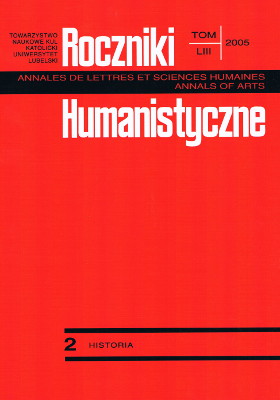Związek Nauczycielstwa Polskiego na Lubelszczyźnie w konflikcie z władzą i Kościołem w latach trzydziestych XX wieku
Abstrakt
The article is concerned with the interesting problem connected with the social relations in Poland in the years 1918-1939, and that is the question of the ideological image of the Polish intelligentsia of that epoch. Polish teachers of that time may be considered the nation's intellectual elite. The teachers' main trade union, the Polish Teachers' Association, came into various conflicts with the Church hierarchy. This resulted to a large degree from the positivist (scientistic) formation of the then elite. Scientism, defined as having a peculiar “faith in the science”, in the opinion of many people did not agree with the “fideist” attitude. The peak of that conflict fell on 1937, when the Board of Directors of the Association was suspended by the state authorities as it was suspected of Communist influences.
However, the research conducted by the author shows that the greater part of the PTA activists were not willing to accept the Communist ideology; on the contrary, they assumed a hostile attitude towards it. On the other hand, the anticlerical position they took in many cases was connected with leftist social views and with the already mentioned positivist intellectual formation. Another important thesis the author of the article tries to prove is the fact of the intelligentsia's gradual departure from the antireligious, scientistic attitude (especially in the 1930's), and ever more frequent submission to the Church's pastoral influences.
Bibliografia
Brzozowski S., Czerwony Lublin (Rocznik Ogniska Nauczycielskiego), Lublin 1959.
Cieśla A., Związek Nauczycielstwa Polskiego w województwie warszawskim w Drugiej Rzeczpospolitej, Toruń 2000.
Historia wychowania wiek XX, red. J. Miąso, Warszawa 1984.
Glass H., Wpływy kominternu wśród nauczycielstwa, Warszawa 1938.
Grześ B., Związek Nauczycielstwa Polskiego od korzeni po współczesność, Warszawa 2000.
Chajn L., Wolnomularstwo II Rzeczpospolitej, Warszawa 1975.
Jaroszczuk T., Julian Aleksander Smulikowski 1880-1934, Olsztyn 1996.
Kosiński K., O nową mentalność. Życie codzienne w szkołach 1945-1956, Warszawa 2000.
Kozioł H., 35 lat temu. Na znak protestu, „Sztandar Ludu” zdn. 11X 1972r.
Mauersberg S., Orientacje ideologiczne w ruchu nauczycielskim w Polsce 1918-1939, w: Katolicka a liberalna myśl wychowawcza w latach 1918-1939, red. E. Walewander, Lublin 2000.
Wilk S., Episkopat Kościoła katolickiego w Polsce w latach 1918-1939, Warszawa 1992.
Wycech Cz., W 25-lecie strajków nauczycielskich, „Przegląd Historyczno-Oświatowy” 1962, nr 2.
Copyright (c) 2005 Roczniki Humanistyczne

Utwór dostępny jest na licencji Creative Commons Uznanie autorstwa – Użycie niekomercyjne – Bez utworów zależnych 4.0 Międzynarodowe.





